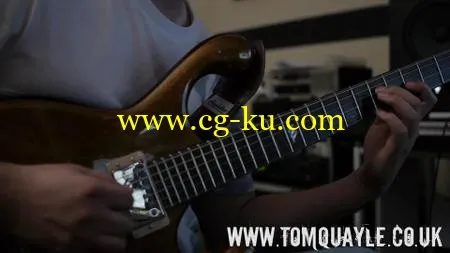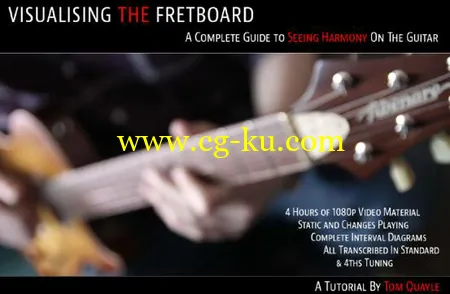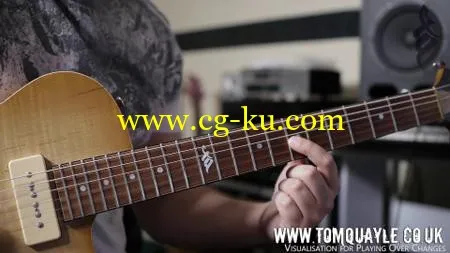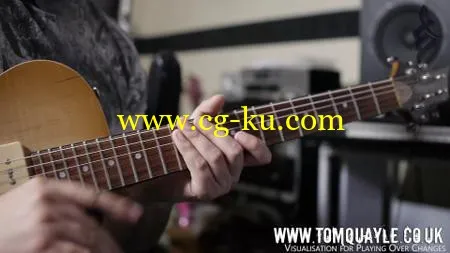
Tom Quayle - Visualizing The Fretboard
WEBRip | MP4 + MP3 jam tracks + PDF tabs | English | 1920 x 1080 | AVC ~3241 kbps | 23.976 fps
AAC | 317 Kbps | 48.0 KHz | 2 channels | 01:54:54 | 5.82 GB
Genre: eLearning Video / Guitar lesson
For his latest tutorial, Tom presents a complete method for learning and seeing harmony on the fretboard. With 4 hours of 1080p video content, Tom teaches pure fretboard visualisation for static and changes based harmony with masses of examples, assignments and diagrams, all tabbed out in standard and Tom's 4ths tuning.
This Lesson download is an intervallic formula based tuition for improvising over changes. Tom teaches us to break out of the constraints of scale and arpeggio type playing where scales and arpeggios often dictate the lines we play.
If you've been wanting to know how to break out of the boxes in your playing this practical lesson in fretboard visualisation is definitely without a doubt for you.
It is 4hrs of HQ HD and looks great even on a 46inch screen with some major close ups on the fretboard. Check out the files you get in the download and we⬙ll get stuck into the review
Video 1
Tom first walks us through the 2 other widely used concepts of fretboard visualisation ( 3-note per string and c-a-g-e-d system) He points out their usefulness and inadequacies in regards to playing through modulation or key changes.
Next Tom shows us the importance of learning the root notes all over the neck and demonstrates ways to make this vital ingredient easier to learn. Small chunks and one-octave sections make it far easier for the brain to connect and learn the interval shapes.
Tom teaches 4 concepts he uses for all intervals; same string, adjacent strings, lower and string skipped lower intervals, plus how these all stay the same through changes, where only the note names change.
Without giving too much away, Tom meticulously teaches us all the intervals we need to know. Everything is there to make up the tools we need for composition and improvising.
Tom shows how he thinks and maps out through scales when improvising, and then demonstrates it.
He them moves from visualising intervals chord tones to visualising intervals that make scales.
He explains the benefits of using this knowledge in smaller brain friendly chunks and the benefits of phrasing with it instead of automatic muscle memory runs.
Video 2
Tom now takes us through the concepts we learned in the first video and teaches us how to practically apply them to changes playing concepts.
This second part is where tom really shows his great teaching skills and guides us into creating lines and traversing through changes with interval recognition from the first chapter.
This is a fantastic tool that works incredibly well and takes me personally into uncharted territory via Toms step by step methodology.
We learn 3 exercises in free time, song forms, are of the jazz genre and consist of, Autumn leaves , Spain and Inner Urge (plus bonus track) so you⬙ll be getting your jazz tickle on for sure.
Tom explains the functional and non functional nature of these tracks and gets into the chords for Autumn Leaves in Bb (first 8 bars)
Although Tom states he is not teaching jazz harmony he does talk about the 251 types the song has and what each chords function is in relation to the roman numeral or numbers system.
Tom then launches into the different ways people learn to visualise over these chords in scale forms, then arpeggio form. He speaks on the pros and cons of these larger pieces of information types.
Then we learn the way Tom thinks when he plays, focusing in, using intervals in one-octave chunks. We are shown that there are different ways to learn these, limitation and freeform.
The progressive way tom teaches this, starting with just locating root notes shows up that I need to work on note location.
Tom goes methodically through each of the other tracks showing us in incremental steps how to think when improvising and writing in a way that will add to our thought process in any chord progression situation.
I have left out many great insights and pearls from this review so you will have to get the tutorial and I promise you wont be disappointed.
I recommend this to everyone learning guitar even if you⬙re not into jazz because the fundamentals Tom teaches will be useful for any style or situation.



发布日期: 2016-08-17